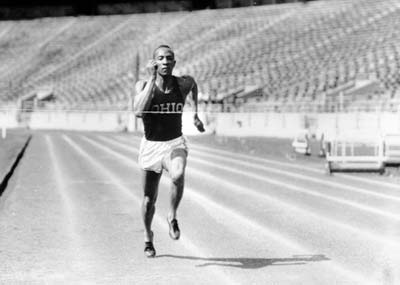|
|
||
|
On August 1, 1936 the Olympic games began in Berlin Hitler and top Nazis seek to gain legitimacy through favorable public opinion from foreign visitors and temporarily refrain from actions against Jews. Adolf Hitler rides a motorcade through Brandenburg Gate to the opening ceremonies of the eleventh Olympiad in Berlin, August 1,1936. The games had been awarded to Germany before Hitler came to power. During the Olympics, a three-week moratorium on anti-Jewish measures was put into effect to create a favorable impression upon foreign visitors. Inside the newly built Olympic Stadium in Berlin, Germans salute Adolf Hitler at the opening of the Olympic games. Hitler took a keen interest in the games and the early victories of the German athletes. However they were over shadowed by the record-breaking performances of American runner Jesse Owens. In
Berlin, dictator Adolf Hitler and Nazi followers felt sure that the
Olympics would be the ideal venue to demonstrate Germany's
oft-stated racial superiority. He directed that $25 million be
spent on the finest facilities, the cleanest streets and temporary
withdraw of all outward signs of the state-run anti-Jewish campaign.
By this time over 4,000 athletes from 49 countries arrived for the
games.
There were doubts in many quarters about the wisdom of attending the
Berlin Olympics. An
alternative to be called “Peoples Olympics,” was actually
scheduled for Barcelona but the Spanish Civil War destroyed that
plan.
In the United States a move to boycott the Olympics was led
by Judge Jeremiah T. Murphy president of the Amateur Union (AAU).
Murphy and his supporters were concerned chiefly about Nazi
anti-Semitism, since Jewish sports clubs throughout Germany had been
shut down.
However, in 1935 the AAU voted by a narrow margin to sanction
participation and Murphy resigned.
He was replaced by Avery Brunage who went to Germany on an
inspection tour and that everything looked just fine.
Despite the preliminary and the growing international
tensions that were to culminate in World War two, the 1936 Olympics
attracted more countries (49) and more athletes (4,066) than any
previous Olympics. But the
nationalistic and materialistic atmosphere in Berlin alarmed many
athletes and members of the press.
The ever-present swastika and icon-like portraits of Adolf
Hitler the material music blared endlessly through loudspeakers were
disturbing to a lot of people.
Nor did it help that many journalists, suspected of anti-Nazi
sentiments, discovered that their rooms had been searched by secret
police.
In Nazi Germany’s pro Aryan setting, it was ironic that the
greatest athletic hero was Jesse Owens, the black American runner.
Owens won the 100-and200-meter dashes and the long jump and
also anchored the U.S.A. 400-meter relay team to a gold medal.
Hitler’s ”snub” of Owens is a well-known story, but is
not accurate. The German leader, who was prominently on display is
his regale box, personally congratulated the first two Germans and a
Finn. With darkness
looming and rain threatening, he left the stadium after all the
German competitors had been eliminated from the high jump.
After setting national records in high school Jesse Owens
attended Ohio State University, where he became an all American.
On May 25, 1935, at the Big Ten Conference Championships,
Owens broke three world records and tied a fourth, all in a
70-minute span.
A lot of colleges tried to recruit Jesse but he chose Ohio
State University. He
met some of his finest competition, and not just on the track.
The United States was still trying to desegregate in 1933,
which led to many difficulties for Jesse.
He could not live on campus because of his color.
When they went on bus trips he had to eat in blacks-only
restaurants and stay in blacks-only hotels.
Some white hotels would allow blacks to stay but they had to
go in and out the back door, and had to use the stairs and not the
elevator.
In the 1936 Berlin Olympics, he won four gold medals:
‘100-meter dash in 10.3 seconds (tying the world record), long
jump with a jump of 26’5 meters high (Olympic record) 200-meter
dash in 20.7 seconds (Olympic record), and 400-meter relay (first
leg) in 39.8 seconds (Olympic and World record).'
Matt Wehrli 7th Grade Rossville Jr. High Spring 2001 |

